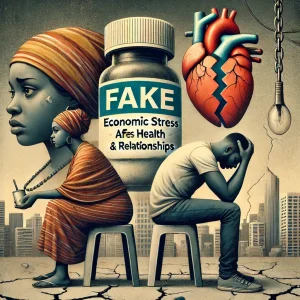------------ summary ------
Economic stress in Nigeria has triggered a severe health crisis. Fake medicines endangering public health, poor nutrition undermining immunity, and strained relationships leading to violence and breakdowns make the situation critical. However, this crisis also presents an opportunity for urgent action and innovative solutions to protect lives, strengthen families, and restore health security.
-----------------------------

Nigeria’s economic crisis is more than just a financial predicament; it is a multifaceted emergency affecting health and relationships. Financial stress is forcing Nigerians to make devastating compromises, like turning to counterfeit medicines, skipping essential nutrition, or dealing with immense mental pressure. At the same time, households are struggling under the strain, leading to increased domestic conflict and social instability. This article uncovers the hidden health and relationship toll of economic hardship in Nigeria, exploring the far-reaching consequences and highlighting the urgent need for intervention.
The economic stress in Nigeria is doing more than draining bank accounts; it’s draining the health and well-being of the nation. From fake medicines and malnutrition to mental health struggles and relationship breakdowns, the impact is far-reaching and deeply embedded in everyday life. Addressing this crisis requires systemic change, improved healthcare access, and economic reforms to ease the burden on Nigerians. Ultimately, it’s not just about finances but about protecting lives, relationships, and the hope for a healthier, more secure future.
Economic stress in Nigeria has triggered a severe health crisis. Fake medicines endangering public health, poor nutrition undermining immunity, and strained relationships leading to violence and breakdowns make the situation critical. However, this crisis also presents an opportunity for urgent action and innovative solutions to protect lives, strengthen families, and restore health security.
-----------------------------

Nigeria’s economic crisis is more than just a financial predicament; it is a multifaceted emergency affecting health and relationships. Financial stress is forcing Nigerians to make devastating compromises, like turning to counterfeit medicines, skipping essential nutrition, or dealing with immense mental pressure. At the same time, households are struggling under the strain, leading to increased domestic conflict and social instability. This article uncovers the hidden health and relationship toll of economic hardship in Nigeria, exploring the far-reaching consequences and highlighting the urgent need for intervention.
Counterfeit Medicines: A Silent Epidemic
The rising cost of healthcare has left many Nigerians unable to afford essential medication, leading to an alarming increase in the use of counterfeit drugs. These fake or untested medicines are often cheaper but carry dangerous consequences, from organ failure to death. Desperation has driven people to gamble with their health, trusting street-sold remedies that do more harm than good. The stress of constant illness or ineffective treatment not only affects physical well-being but also creates immense psychological and emotional strain within families.Poor Nutrition: Health Compromised by Rising Costs
Food insecurity is a direct consequence of financial hardship. As the prices of staple foods continue to climb, many Nigerians are forced to settle for cheaper, nutrient-poor alternatives. The result is widespread malnutrition, particularly affecting children whose development relies on balanced diets. Nutritional deficiencies weaken the immune system, making people more susceptible to diseases. Arguments and tensions often flare in homes with scarce resources, further exacerbating stress levels and adding to the overall crisis.Mental Health Crisis: The Weight of Financial Worries
The psychological toll of economic instability is severe. Chronic anxiety, depression, and burnout are now alarmingly common among Nigerians as people struggle to make ends meet. The pressure to provide for families has resulted in skyrocketing cases of high blood pressure and stress-related illnesses. The emotional burden is often unspoken, but its impact is unmistakable, manifesting in frayed tempers and strained relationships. Parents are particularly affected, worrying endlessly about securing a better future for their children while barely surviving the present.Relationship Strains: A Growing Social Crisis
Economic stress doesn’t just affect individuals; it seeps into homes, turning financial worries into relationship conflicts. Couples find it harder to maintain harmony when money issues dominate their conversations and decisions. Disagreements about budgeting, unmet expectations, and the sheer fatigue from daily struggle have fueled a rise in domestic violence. Furthermore, some people are resorting to desperate measures, such as transactional relationships or even sexual exploitation, to secure necessities for their families.Unsafe Work and Social Practices: Cutting Corners with Grave Consequences
As businesses face economic pressure, safety standards are often the first to be compromised. Workers in various industries, from restaurants to construction, endure unsafe conditions to keep costs low - this puts lives at risk and contributes to the long-term decline in public health. Moreover, bars and eateries looking to save money have started selling fake or unsafe alcoholic beverages, which pose serious health risks, including liver and kidney damage. These cost-cutting measures are a ticking time bomb for both employees and consumers.Road Hazards: The Price of Unroadworthy Vehicles
The economic crisis has also affected road safety. Many Nigerians need help to maintain their vehicles properly, leading to a surge in unroadworthy cars on the roads. These vehicles are prone to accidents, turning everyday commutes into life-threatening experiences. A single accident can push struggling families into further financial ruin, creating a vicious cycle that few can escape unscathed.The Hidden Health Threat: Kidney Disease from Fake Medicines
One of the more insidious health crises arising from economic hardship is the increase in kidney disease. Harmful ingredients found in unregulated or fake medicines are damaging organs and reducing life expectancy. This hidden epidemic is a direct consequence of limited healthcare access and the prevalence of untested drugs. It highlights the devastating impact of a healthcare system under immense financial strain and the urgent need for stronger regulation and support.The economic stress in Nigeria is doing more than draining bank accounts; it’s draining the health and well-being of the nation. From fake medicines and malnutrition to mental health struggles and relationship breakdowns, the impact is far-reaching and deeply embedded in everyday life. Addressing this crisis requires systemic change, improved healthcare access, and economic reforms to ease the burden on Nigerians. Ultimately, it’s not just about finances but about protecting lives, relationships, and the hope for a healthier, more secure future.




